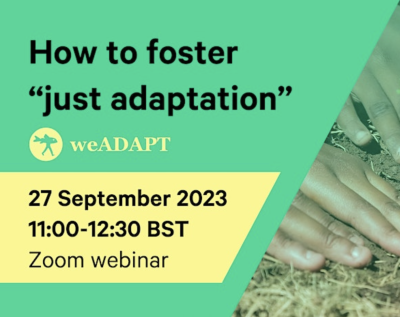Webinar: How to foster “just adaptation”

Summary
On 27 September, weADAPT co-organised a webinar with SEI where experts from around the world shared insights on how to foster “just adaptation” at a time of escalating climate risks.
This article provides an overview of the event, links to recordings, and takeaways from the panel discussions.
About the event
How can the world ensure that “just resilience” emerges at a time of escalating risk? What are the hallmarks of measures that can help the most vulnerable groups and can ensure that their voices are heard? How can sharing and learning from adaptation successes and failures help support the change needed?
These are the questions that were explored and addressed during the weADAPT webinar launching the first in a series of ongoing conversations about key issues to inform climate change adaptation practice and research.
Experts working at the frontier of climate change adaptation practice and research from around the world shared their insights on the topic. The event was structured as follows:
Keynote speech: Srilata Kammila, Head of Climate Change Adaptation, for the UN Development Programme.
Panel discussion, moderated by Karen Brandon, Senior Communications Officer and Editor Communications at SEI Oxford:
- Pirawan Wongnithisathaporn, Environment Programme Officer, Asia Indigenous Peoples Pact (AIPP)
- Dhesigen Naidoo, Head of Adaptation for the South African Presidential Climate Commission
- Frida Lager, Research Associate at SEI and with Adaptation Without Borders
- Sukaina Bharwani, Senior Research Fellow at SEI and a founder of SEI’s online adaptation platform and community, weADAPT
You can replay the event here:
Key messages from speakers
Srilata Kammila, Head of Climate Change Adaptation, for the UN Development Programme
Srilata Kammila views adaptation as a global challenge that requires collective action and a ‘whole of society’ approach. Fundamentally, adaptation needs to be guided by the principles of justice and equity. But what does this mean?
In her speech, she shared three core principles for just adaptation:
- Inclusivity and participation: communities must be active participants in designing and delivering solutions;
- Equitable resource allocation: Financial, technical, technological resources must be allocated in ways that support local adaptation, bearing in mind those who face structural exclusion;
- Gender equality: Adaptation measures should be gender transformative, not just gender responsive. They should strive to empower women.
Pirawan Wongnithisathaporn, Environment Programme Officer, Asia Indigenous Peoples Pact (AIPP)
The connection and deep understanding Indigenous People have of nature means that they are able to find sustainable solutions to many of the issues they face. But climate change is pushing the boundaries of what they can cope with. They are made vulnerable by a political system that does not actively include them in the design and development of adaptation solutions.
Pirawan’s speech is an urgent call to honour and recognise Indigenous rights – until then, Indigenous People will remain voiceless, marginalised and vulnerable to climate change.

Dhesigen Naidoo, Head of Adaptation for the South African Presidential Climate Commission
In South Africa, the just transition framework is based around three core principles:
- Procedural justice: adaptation must be inclusive and must empower people to be part of the decision making;
- Distributive justice: the decision made around climate adaptation cannot cover everyone, and we must plan for this. Equity – not just equality – must be at the forefront.
- Restorative justice: we need to organise for a just transition, and deal with inequities in a way that leave us better off than we were. Can we use this tool as an opportunity to accelerate development around the world?
Climate change poses great risks. But we must view it as an opportunity to move towards a fairer, smarter, and more productive future.
Frida Lager, Research Associate at SEI and with Adaptation Without Borders
Climate risks cascade from producers to consumers, and across countries. It is essential that we reduce climate risks for all – rather than just redistributing them from one country, region or community to another.
A globally just resilience is one that is connected (from a geography and sectoral perspective).

Sukaina Bharwani, Senior Research Fellow at SEI and a founder of SEI’s online adaptation platform and community, weADAPT
Online knowledge spaces play a key role in supporting ‘just adaptation’. weADAPT recognises the power dynamics around climate adaptation information and seeks to challenge and transform the way knowledge is created, organised, shared and access.
The platform is fully user-led, and allows practitioners, researchers, and policy-makers to access credible, high-quality information and connect with one another. It seeks to share information in a collaborative, just and equitable way, by amplifying voices in the global south and those of marginalised groups.
Recent evaluation of the platform and feedback from users has taught us that it provides great benefits around raising awareness, developing capacity/training, planning and implementation and fostering connections.
weADAPT is being redeveloped to further encourage inclusive and equitable access to information through a new green, user-friendly and accessible design.

Audience Participation
The audience was asked to share brief reflections on ‘what are the key ingredients for “just adaptation”?’ via Mentimeter.
Key words the audience came up with echoed many of the messages highlighted throughout the webinar, and included ‘equity’, ‘Inclusivity’, ‘funding’, ‘coping’, ‘commitment’, ‘learning’, ‘participation in decisions’, ‘solidarity’, ‘epistemic justice’ and more as highlighted in the Word Cloud below.

Related resources
- Just Adaptation Webinar Slides
- A Just Transition for Climate Change Adaptation: Towards Just Resilience and Security in a Globalising World
- Just Resilience for Europe: Towards measuring justice in climate change adaptation
- Issues Paper: Challenges and Opportunities for a Just Transition
- Adaptation without Borders
- weADAPT at 15: How Research, Policy and Practice Community Members Use the Platform
- How is weADAPT advancing research on knowledge management?
(0) Comments
There is no content